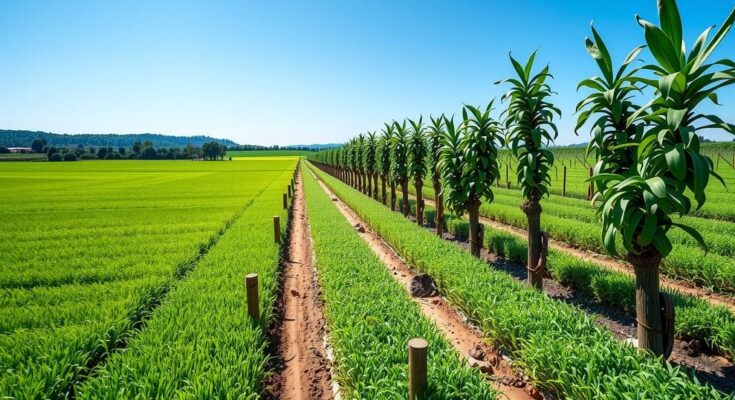Farmers in Madagascar’s vanilla regions face harsh climate changes affecting agriculture, with few adapting practices. Studies show water shortages and health issues worsen, and financial limitations hinder changes. Research expands to include more villages to better understand adaptation needs and strategies.
In Madagascar’s vanilla-growing regions, farmers are increasingly contending with the impacts of climate change, as evidenced by recent studies conducted in 2023. These studies reveal that nearly all local farmers have observed notable changes in temperature and rainfall patterns, negatively affecting their agricultural practices. Despite these challenges, only a small fraction of them are modifying their farming techniques to adapt to the evolving climate.
The villages of Sarahandrano and Mandena, situated approximately 50 kilometers apart near Marojejy National Park, rely on small plots for vanilla, rice, bananas, and coffee cultivation. The farmers employ traditional hand tools and utilize local water sources for irrigation. However, they express concern over dwindling water supplies and increased weather extremes, with about three-quarters of respondents experiencing adverse conditions.
In addition to water scarcity, farmers report increased pest populations and rising health issues, including malaria and diarrhea. Surprisingly, a mere 20% of surveyed farmers have made adaptive changes, such as amending soil with fertilizers or adjusting planting schedules, a rate significantly lower than observed in other regions worldwide, according to lead researcher Tyler Barrett.
The study reflects that men and those possessing more durable goods are more likely to adopt adaptive methods, highlighting financial obstacles that impede others. With approximately 80% of Madagascar’s population living below the poverty line, additional costs associated with new practices present significant barriers. Senior co-author Randall Kramer suggests the need for more supportive programs to facilitate these transitions for financially constrained farmers.
Proposed adaptive strategies include integrating fruit trees and fish farming in rice paddies, which can enhance food security, contribute to fertilization, and aid in pest management, as emphasized by study co-author Voahangy Soarimalala. Farmers in Madagascar are further threatened by extreme weather events such as cyclones and tropical storms, which increase the risks faced by already vulnerable agricultural communities.
Beyond the northeast, other regions, such as Andringitra, also feel the effects of climate variability, evidenced by local elders noting a decade without frost. National data indicates a warming trend and decreased rainfall over the past 50 years, a worrying sign for farmers, particularly in tropical zones, as highlighted by Professor Kramer. In response, the research team plans to extend their surveys to 34 additional villages to ascertain broader patterns across various habitats and explore the implications of farmers’ adaptations.
Ultimately, the researchers emphasize the necessity for smallholder farmers to develop greater flexibility and resourcefulness to cope with climate change. Such adaptability is crucial as farming success directly influences family sustenance, raising the stakes of each growing season.
Funding for this research was provided by multiple institutions, including the NIH-NSF-NIFA Ecology and Evolution of Infectious Disease Program.
The research underscores the significant impact of climate change on farmers in Madagascar, particularly those producing vanilla and other crops. Despite clear indications of environmental changes, there remains a low rate of adaptive practices among these farmers, largely due to financial constraints. With continued studies expanding the geographical scope, the findings may inform strategies to better support smallholder farmers in their transition to more resilient agricultural practices, ensuring food security amid climate challenges.
Original Source: today.duke.edu




